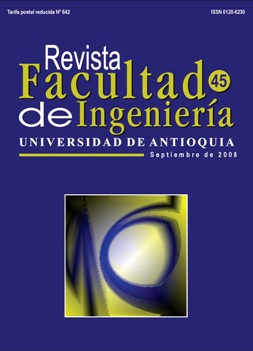Solution for the hydrothermal dispatch problem using Monte Carlo simulation and interior point
DOI:
https://doi.org/10.17533/udea.redin.18120Keywords:
Hydrothermal dispatch, Monte Carlo simulation, interior point method, nonlinear programming, stochastic optimizationAbstract
Hydrothermal dispatch establishes the suitable relation between hydraulic and thermal generation with optimal operative cost in a planning period, according to generation, transmission and load restrictions; moreover, it establishes the rational and efficient use of the energetic resources in the power electric systems. Normally the hydrothermal dispatch problem has been simplified to find a solution with a reasonable computational time. The principal simplifications have been: to fit lineally the thermal functions cost, to eliminate the network restrictions, to dispatch in a unique node and to consider the load and reservoir flow in a deterministic way. This paper presents a methodology which solves the hydrothermal dispatch problem using interior point method and Monte Carlo simulation, the proposed model considers the thermal cost curves, the network restrictions and the stochastic forecasting of load and reservoirs flow, allowing to obtain probability distributions of the output variables (cost function, output power, etc).
Downloads
References
C. Romero, M. Vahos. “Modelamiento del caudal de un río para estudios de confiabilidad de largo plazo de sistemas eléctricos”. Scientia et Technica Vol. 34. 2007. pp. 97-101.
C. Zapata., J. López, R. Ericsson. “Efecto del modelamiento de la demanda en estudios de confiabilidad de largo plazo de sistemas eléctricos”. Scientia et Técnica. Vol. 32. 2006. pp. 43–48.
D. Velásquez, C. Zapata. Pronóstico del caudal medio mensual, con una ventana de 12 meses, usando sistemas difusos. Proyecto de Investigación. Universidad Nacional De Colombia – Medellín. 2004.
N. Obregón, F. Fragala, L. F. Prada. “Redes neuronales artificiales en hidroinformática”. Seminario Internacional: La Hidroinformática en la Gestión Integrada de los Recursos Hídricos. Cartagena, Colombia. 2003. pp. 1– 5.
N. Prasad “Unit Commitment—A Bibliographical Survey”, IEEE Transactions on power systems, Vol. 19. 2004. pp 1196-1205. DOI: https://doi.org/10.1109/TPWRS.2003.821611
L. Martínez, S. Soares. “Primal and dual stochastic dynamic programming in long term hydrothermal scheduling”. Power Systems Conference and Exposition, IEEE PES2004. Vol. 3. pp. 1283-1288.
J. Bedoya, M. Barrera. “Programación dinámica estocástica aplicada al problema del despacho hidrotérmico” Scientia et Technica Vol. 28. 2005. pp. 53-58
H. Habibollahzadeh, G.X. Luo, A. Semlyen. “Hydrothermal optimal power flow based on a combined linear and nonlinear programming methodology”. IEEE Transactions on Power Systems. Vol. 4. 1989. pp. 530-537. DOI: https://doi.org/10.1109/59.193826
A. L. Diniz, C. Sagastizábal, M. E. P. Maceira. “Assessment of Lagrangian Relaxation with Variable Splitting for Hydrothermal Scheduling”. Power Engineering Society General Meeting. 2007. IEEE. 2007. pp. 1-8. DOI: https://doi.org/10.1109/PES.2007.386246
C. Zoumas, A. Bakirtzis, J. Theocharis, V. Petridis. “A genetic algorithm solution approach to the hydrothermal coordination problem”. IEEE Transactions on Power Systems. Vol. 19. 2004. pp.1356-1364. DOI: https://doi.org/10.1109/TPWRS.2004.825896
T. Cau, R. Kaye. “Evolutionary optimization method for multistorage hydrothermal scheduling”. Generation, Transm. and Distrib. IEE Proceedings. Vol. 149. 2002. pp. 152-156. DOI: https://doi.org/10.1049/ip-gtd:20020120
L. Lakshminarasimman, S. Subramanian. “Short-term scheduling of hydrothermal power system with cascaded reservoirs by using modified differential evolution”. Generation, Transmission and Distribution, IEE Proceedings. Vol. 153. 2006. pp. 693-700 DOI: https://doi.org/10.1049/ip-gtd:20050407
C. Nallasivan, D. S. Suman, H. Joseph, S. Ravichandran. “A novel approach for short-term hydrothermal scheduling using hybrid technique”. IEEE Power India Conference, 2006. pp.5-12. DOI: https://doi.org/10.1109/POWERI.2006.1632593
J. C. Medina, V. H. Quintana, A. J. Conejo, F. PCrez Thoden. “A comparison of interior-point codes for medium-term hydro-thermal coordination” IEEE Transactions on Power Systems. Vol. 13. 1998. pp. 836-843 DOI: https://doi.org/10.1109/59.708701
Z. Daoyuan, L. Peter, Z. Yuanhui. “A bundle method for hydrothermal scheduling”. IEEE Trans. On Power Systems. Vol. 14. 1999. pp. 1355-1361 DOI: https://doi.org/10.1109/59.801896
S. Tong, S. Shahidehpour. “Hydrothermal unit commitment with probabilistic constraints using segmentation method”. IEEE Transactions on Power Systems. Vol. 5. 1990. pp. 276282. DOI: https://doi.org/10.1109/59.49117
J. Dhillon, S. Parti, D. Kothari. “Fuzzy decision-making in stochastic multiobjective short-termhydrothermal scheduling”. Generation, Transmission and Distribution, IEE Proceedings. Vol. 149. 2002. pp. 191-200 DOI: https://doi.org/10.1049/ip-gtd:20020176
B. Gorenstin, N. Campodónico, J. Costa, M. Pereira. “Stochastic optimization of a hydrothermal system including network constraints”. IEEE on PAS. Vol.7. 1992. pp. 791-797 DOI: https://doi.org/10.1109/59.141787
R. Billinton, R. Allan. Reliability evaluation of engineering systems. Concepts and Techniques. 2ª ed. Plenum Press. 1992. pp. 405-409 DOI: https://doi.org/10.1007/978-1-4899-0685-4
A. Garcés, J. C. Galvis, O. Gómez. “Algoritmo Evolutivo Diferencial Aplicado al Problema de Despacho Hidrotérmico”. Scientia et Technica. Vol. 32. 2006. pp. 187-192
J. M. Rider. “Método de punto interior aplicado a la optimización en sistemas eléctricos”. Seminario de optimización en sistemas de potencia. Pereira. 2004.
C. Correa, A. R. Bolaños, A. Garcés Ruiz. “Métodos no lineales de Punto interior aplicados al problema del despacho hidrotérmico”. Scientia et Técnica. Vol. 34. 2005. pp. 91-96
A. Word, B. Wollenberg. Power generation, operation and control. John Wiley & Sons. New York. 1984. pp. 251.
Downloads
Published
How to Cite
Issue
Section
License
Revista Facultad de Ingeniería, Universidad de Antioquia is licensed under the Creative Commons Attribution BY-NC-SA 4.0 license. https://creativecommons.org/licenses/by-nc-sa/4.0/deed.en
You are free to:
Share — copy and redistribute the material in any medium or format
Adapt — remix, transform, and build upon the material
Under the following terms:
Attribution — You must give appropriate credit, provide a link to the license, and indicate if changes were made. You may do so in any reasonable manner, but not in any way that suggests the licensor endorses you or your use.
NonCommercial — You may not use the material for commercial purposes.
ShareAlike — If you remix, transform, or build upon the material, you must distribute your contributions under the same license as the original.
The material published in the journal can be distributed, copied and exhibited by third parties if the respective credits are given to the journal. No commercial benefit can be obtained and derivative works must be under the same license terms as the original work.










 Twitter
Twitter